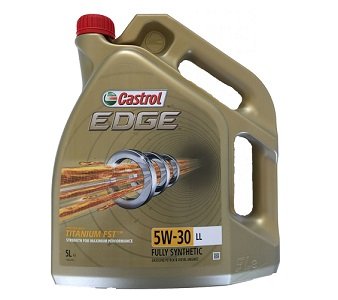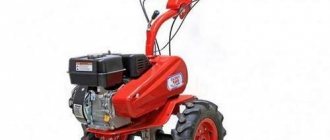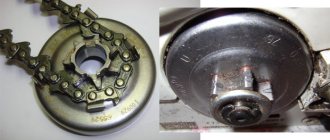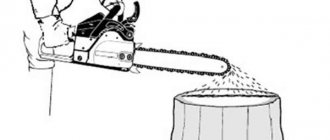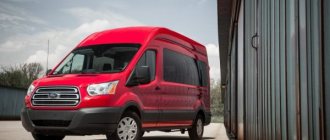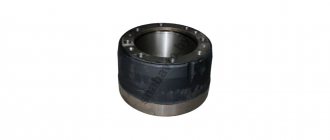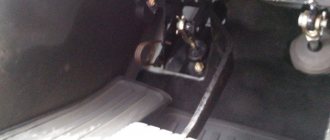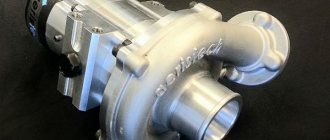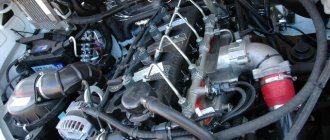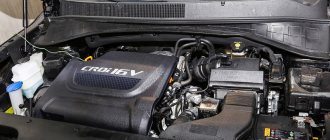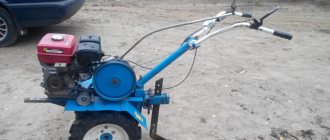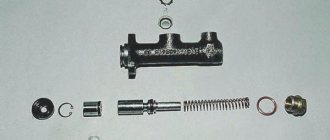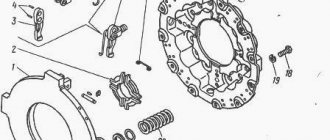The legendary Ford Transit series, which includes minibuses, vans and other onboard modifications, is increasingly gaining popularity among Russian motorists. And all this thanks to the high quality, comfort and unsurpassed safety margin of these cars. Accordingly, every motorist, when selecting motor oil for a Ford Transit, must know the factory tolerances and types of motor oils suitable for replacement in the engine of these vehicles. About tolerances
Gasoline engines:
- GZFB; GZFA; GZFC.
Diesel engines:
- P8FA; P8FB, DRFA; DRFB; DRFC; D.R.F.D.; DRFE, SRFA; SRFB; SRFC; SRFD; SRFE, CYFA; C.Y.F.B.; C.Y.F.C.; CYFD, CYRB; CYRC, CYFA; CYRA; CYRB, PGFB; UHFA; UHFB; UHFC; PGFA, CVRA; CVRB; CVRC, JXFC; JXFA, H9FB, H9FD, SAFA; SAFB, Duratorq TDCi, USR6, CVR5; UYR6; CV24.
The manufacturer provides the following recommendations regarding the selection of the appropriate engine oil according to the specification.
Engine oil Ford Transit gasoline
Aspirated Ford Transit engines operate on motor oil with WSS-M2C913-A approval. This is the original Ford Formula F 5W30 oil and its substitutes Castrol Magnatec A5 5W-30 and Motul Specific 913D.
| Ford Formula F 5W30 | 4 liters Article: 14E8BA Average price: 2300 rubles 1 liter Article: 14E8B9 Average price: 650 rubles |
| Castrol Magnatec A5 5W-30 | 4 liters Article: 15583D Average price: 2600 rubles 1 liter Article: 153EFF Average price: 650 rubles |
| Motul Specific 913D | 5 liters Article: 104560 Average price: 3200 rubles 1 liter Article:104559 Average price: 980 rubles |
Ford Transit diesel oil
Ford Transit diesel engines use oils with WSS-M2C913-C approval. This is the original Ford Formula F 5W30 oil and its analogues SHELL Helix HX8 Synthetic 5W-30, Lukoil Genesis Claritech 5W-30 and so on.
| Ford Formula F 5W30 | 4 liters Article: 14E8BA Average price: 2300 rubles 1 liter Article: 14E8B9 Average price: 650 rubles |
| SHELL Helix HX8 Synthetic 5W-30 | 4 liters Article: 550040542 Average price: 2200 rubles 1 liter Article: 550040462 Average price: 550 rubles |
| Lukoil Genesis Claritech 5W-30 | 5 liters Article: 1539487 Average price: 2200 rubles 1 liter Article:1539436 Average price: 600 rubles |
Second generation[ | ]
Mark I Ford Transit
Mark I (United Kingdom Numbering) Ford Transit Minibus after facelift Ford Transit - ice cream van with a redesigned higher roof
The first real Ford Transit appeared in October 1965. At first the van was produced at the English plant. Langley, Berkshire in Berkshire, England (the former aircraft manufacturing plant that produced Hawker Hurricane fighters during World War II), but as demand outpaced the plant's capacity, production was moved to Southampton. Production of this generation was discontinued in 1978.
Transit came to replace the English one. The Ford Thames 400E is a small, mid-engine, front-wheel drive van known for its narrow track. Thames competed with similar-looking but larger English vans. Morris Commercial J4 Morris Commercial J2 and Commer PB series from Rootes Group. The UK market was then dominated by English. Bedford CA. Thames 400E was losing out to competition due to its limited loading area, which did not allow it to win a sufficient number of customers. So Ford went back to the drawing board and switched to a front-engine layout, following the course set in the 1950s by manufacturer Bedford with its well-regarded CA series vans. The revolutionary step of Henry Ford II was to combine the developments of English. Ford of Britain and English Ford of Germany to create a prototype for today's English. Ford of Europe - Previously, these subsidiaries avoided competition in each other's home markets, but were in direct competition in the rest of the European markets.
The Transit deviated from European commercial vehicles with its American design—the wide track gave a huge advantage in cargo capacity over comparable vehicles of the time. Most of the Transit's mechanical components were adapted from cars of the era. Another key to the success of the Transit is a large range of different body solutions [ source not specified 960 days
]: long and short wheelbase cargo vans, flatbeds, minibuses, crew cabs are just some of the options available.
In the UK, an English engine was used for the petrol modification. Essex V4 with a volume of 1.7 liters. and 2.0 l. By favoring relatively short V4 engines, Ford was able to minimize the extra length required by the decision to place the engine in front of the driver.[3] Another popular improvement under the bonnet of a van was an alternator, while competitors in the UK market expected buyers to be satisfied with a DC alternator[3]. A diesel engine with an effective output of 43 hp was also offered. With. (32 kW), supplied by Perkins. Since this engine was too long to fit under the Transit's hood, the diesel version had a redesigned, longer engine bay. The low-power Perkins were not in demand and were replaced by Ford in 1974 with its own York engines. For mainland Europe, the Transit had the German Ford Taunus V4 engine in two versions: Cologne 1.7 liter. and Essex 2.0 l. The long nose of the diesel conversion was also used to accommodate the Ford 3.0L engine. V6 in police and ambulance vans, and in Australia to accommodate the inline 6-cylinder engine of the Ford Falcon.
According to the show Top Gear
; English police reported that in the 1970s, 95% of all robberies in which a car was used involved this type of Ford Transit.[1]
The choice of front and rear driving axles instead of a system that includes an independent front suspension, like the English one. The Ford Thames 400E may have been seen by some as a step back in time, but on the road commentators felt that the Transit's wider track and longer wheelbase more than compensated for the obvious step back represented by the suspension choices. Drivers also praised the elimination of excessive cabin heat that resulted from placing the driver above or directly next to the engine bay in the Thames 400E and other front-wheel drive light vans of the 1950s and early 1960s.[3]
Oil Ford Transit 2.2
A suitable oil for Ford Transit 2 2 diesel must comply with the WSS-M2C913-C approval. This, as mentioned above, is the original Ford Formula F 5W30 oil and many of its analogues with 5W30 viscosity (MOBIL 1 ESP Formula 5W-30, Toyota Diesel CF 5W-30, and so on).
| Ford Formula F 5W30 | 4 liters Article: 14E8BA Average price: 2300 rubles 1 liter Article: 14E8B9 Average price: 650 rubles |
| MOBIL 1 ESP Formula 5W-30 | 4 liters Article: 152053 Average price: 3200 rubles 1 liter Article:152622 Average price: 950 rubles |
| Toyota Diesel CF 5W-30 | 4 liters Article: 08883-81015 Average price: 3200 rubles 1 liter Article: 08880-80846 Average price: 850 rubles |
Ford Transit reviews
Ford Transit 1997 reviews
Name:
lue
City:
Ukhta 7 years ago Messages: 320 Transit, 1997, Diesel, Transmission, Rear-wheel drive
Pros:
excellent handling, ergonomic interior, high load capacity, drives like a passenger car, low fuel consumption.
Cons:
it's cold in winter, the body rots quickly.
Name:
fur Sergey Transit, 1997, 2500 cc.
see, Diesel, Transmission, Rear-wheel drive, cargo Pros:
easy to handle
Cons:
does not like severe frosts,
Ford Transit 2005 reviews
Name:
Svyatoslav Transit, 2005, 2000 cc.
see, Diesel, Transmission, Front-wheel drive Pros:
the engine has done 400 thousand without any complaints, the clutch is fine and I may soon change the chain
Name:
Svyatoslav Transit, 2005, 2000 cc.
see, Diesel, Transmission, Front-wheel drive Pros:
Reliable, stable, playful, strong... Disadvantages: Cons:
Disadvantages
: cold at minus 20 and below, can sink in the face in the mud, inconvenient to repair, weak front hubs if you drive fast.
Name:
Sanchela 2005 Transit, 2005, 2400 cc.
see, Diesel, Transmission, Rear-wheel drive Pros:
I have a maxi base, not a twin, I load 1.5 2 tons almost every day, there have been no serious problems in 7 years. The engine has run almost 800,000 thousand. I didn’t go overboard and bought it from an imported Englishman I've been going for $1,500 for the second year now, no problems.
Cons:
it rusts, of course, but I can’t wait to clean up the primer paint and get back on the road.
What was repaired:
There were no serious problems, I brought the cardan to the specialists, they re-sharpened it for stronger crosspieces, also the Ford ones were centered and distorted.
Name:
egor efimov Transit, 2005, 2400 cc.
see, Diesel, Transmission, Front-wheel drive, blue, ABS, driver airbag, steering wheel, central locking Pros:
Two years ago we bought two new Transits from Impex for the office.
Their mileage is active, transporting employees, transporting as needed, they reel in 5 thousand a month. There were no big problems. Maintenance approximately every 3 months. It’s a pleasure to work with this dealer, they have never missed deadlines, and the quality of work is also ok. Cons:
One had problems with the suspension, which were fixed under warranty,
Ford Transit 2006 reviews
Name:
Kirill Anikin Transit, 2006, 2200 cc.
see, Diesel, Transmission, Front-wheel drive What was repaired:
This car is not very suitable for our conditions.
In general, in general, for its specifications, its price is quite overpriced in my opinion. It has such a problem that by 70k mileage the clutch fails. It is not suitable for our domestic fuel, it is very demanding. And the on-board computer often malfunctions. Name: City:
Bakhchisarai Transit, 2006, 1998 cc.
see, Diesel, Transmission, Front-wheel drive, 5+1+3 Pros:
High and comfortable seating position.
Visibility is excellent and the cabin is wide, spacious, accessible and roomy. The engine is powerful enough, even though it says 85 (hp), but it’s so torquey and torquey that it seems to me that the turbine spins up much more, overtaking with afterburner is a blast! On a steep climb in 5th gear it picks up speed, like in a car. At the same time, the consumption is 7-9 liters, depending on how you drive. Universal use, good for family, good for work. Distance doesn't matter. You won’t get tired on the way, you can get a full night’s sleep. The chassis swallows up everything bad on the road, but simply rustles on good asphalt. Ground clearance is impressive. It’s ascetic inside, but everything you need is there, I’m not picky. In a word - I like the machine! Cons:
Mine lacks air conditioning.
It gets hot in the summer, but open windows solve the problem. And there aren’t enough electric windows; to open the window on the passenger door, you have to lift the armrest and lie on your side to reach the handle, or walk around the car. Well, electrically adjustable mirrors wouldn't hurt. And also, the metal is prone to corrosion, especially from below, wheel arch liners, etc. I heard from many transit people about this too. But the problem is solved by specialists with a bang. What was repaired:
I didn’t have any serious damage.
The previous owner had a problem with the right spring, it fell off due to rust. Cooked. My turbine air hose fell off once on a long road trip. The craving immediately disappeared. But the craftsmen told me that it was not original, someone had remade it. I secured it back and went with the breeze. Now the rack has started to tap, I can do a restoration, it looks like I’m on the way to repairing the pump and replacing the almost frayed connecting hoses of the “water” cooling of the engine, replacing the belt (it’s been damaged), and maybe I’ll get around to replacing the rear engine crankshaft oil seal (it gets wet), but it’s not leaking. The oil is normal, it does not take. Yes, and one of the injectors is a little wet, but it works like a clock. Although the actual mileage is already over 212,000 km, nothing has been done to the engine. Name:
Chelent Transit, 2006, 2200 cc.
see, Diesel, Transmission, Front-wheel drive, Trand Pros:
Reliable, economical hard worker 5+
Cons:
Vinyl interior.
In summer it heats up unbearably, in winter it’s the opposite. What was repaired:
There were no serious breakdowns in 140,000 km. With the exception of small ones (replacing lamps, window lift button). Mostly consumables. To 100,000 km. replacement of brake discs, wheel bearings, steering tips.
Ford Transit 2007 reviews
Name:
Mikhail Transit, 2007, 2200 cc.
see, Diesel, Transmission, Front-wheel drive, clx Pros:
very cool high-torque engine 130 hp comfortable overall car. I drive almost 3500 tons of km per month, no problems
Cons:
no 7th gear)))),
Ford Transit 2008 reviews
Name:
Erokhin Transit, 2008
What was repaired:
Yes, the saffron cap is coming out quite noticeably over time.
Anyone whose mileage reaches 70,000 km knows that the clutch wears out and requires repair. In general, his consumption is not very pleasing, it is quite impressive and there is often a strong addiction to oil. One of the serious disadvantages is that for repairs you need a specialist. equipment, and Transit repairs are already not the cheapest. Name:
Iwan Sotnikow Transit, 2008, 2200 cc.
see, Diesel, Transmission, Front-wheel drive, base Pros:
I have a 2008 Transit.
I bought it second hand, but the car is new. After driving the first 11,000 kilometers, the windshield wiper failed. I went to the main service center near the Yuzhnaya metro station. It turned out that a relay burned out in the electronic unit. I was worried that the warranty had expired, but they replaced the relay separately and quickly enough. Cons:
There are no particular shortcomings for operation
What was repaired:
Mileage 11,000 kilometers - the windshield wiper failed.
Name:
nadoroge
City:
9 years ago Posts: 15 Transit, 2008
Pros:
The car is reliable, there was a topic when the hub was covered, but it still lasted 80 km.
Repairs are not expensive, I get service from a company service center not far from my house in the north, Dubninskaya Street. I keep it in a warm garage in winter, even when I kept it outside, it starts normally, without problems. I’m thinking of getting a newer one soon, because the car is perfect for my work. Cons:
If you drive loaded, the driving performance is noticeably worse, overtaking is problematic.
When driving actively in the cold season, iron is quickly consumed by chemicals. Name:
Sasha 1984 Transit, 2008, 1800 cc.
see, Gasoline, Transmission, Front-wheel drive Pros:
not the first year behind the wheel, there is something to compare with.
workhorse. reliable and faithful. I bought it a year ago from Impex on Dubninskaya. in a year I reeled in almost fifty thousand without problems, or there will be more!!! Cons:
the body, of course, deteriorates from road chemicals, but tanks are not afraid of dirt!,
Ford Transit 2009 reviews
Name:
novel Transit, 2009, 2200 cc.
see, Diesel, Transmission, Front-wheel drive Pros:
high-torque, steers well, brakes well.
Cons:
expensive spare parts, expensive maintenance, it’s problematic to do something with your own hands, you need special tools,
Name:
suffer Transit, 2009
Pros:
I purchased a new Ford Transit for my organization. From the officials. It’s a good, reliable van, the driver is happy, he drove a gazelle before, and I felt the difference right away. Comfort in the cabin, conveniently opening doors that facilitate quick loading and unloading, a modern control panel, in short, a fairy tale. It turns out to be a kind of office on wheels.
What was repaired:
Only a small problem immediately became clear - the lock on the back door refused to work on the fifth day. We drove up to the official car service center, no questions arose, they replaced it. It’s not even noticeable that anything has been changed.
Popular questions:
| Comparison of Mercedes GLC or Subaru Forester |
| Comparison of Honda Elysion or Toyota Alphard |
| Comparison of Kia Rio X-Line or Kia Serato |
| Comparison of Hyundai Creta or Skoda Rapid |
| Comparison of Hyundai Creta or Haval H6 |
| Comparison of Suzuki Vitara or Kia Rio X-Line |
| Comparison of Mercedes GLC or Hyundai Santa Fe |
| Comparison of Nissan Atlas or Isuzu Elf |
| Comparison of Nissan X-Trail or Toyota Fortuner |
| Comparison of Honda Fit or Toyota Aqua |
| Comparison of Toyota Camry or Citroen C5 |
| Comparison of Nissan Note or Toyota Aqua |
| Comparison of Mazda CX-5 or Toyota Camry |
| Comparison of Nissan Atlas or Mazda Titan |
| Comparison of Kia Optima and Hyundai Tussan |
| Comparison of Hyundai Creta and Mitsubishi Outlander |
| Comparison of GAZ Sobol or GAZ GAZelle |
| Comparison of Kia Rio X-Line or Mitsubishi ACX |
| Comparison of Honda Freed or Toyota Fielder |
| Comparison of Toyota Estima or Honda Elysion |
Ford Transit 2.5 oil
The oil used during engine operation in the Ford Transit 2.5 diesel, just like the oil in the Ford Transit 2.2 engine, is tied to the WSS-M2C913-C approval. Accordingly, you will have to choose between the original Formula F 5W30 and its analogues ELF Evolution Full-Tech FE 5W-30, Castrol Edge Titanium FST 5W-30 LL and other synthetic oils with a viscosity of 5W30.
| Formula F 5W30 | 4 liters Article: 14E8BA Average price: 2300 rubles 1 liter Article: 14E8B9 Average price: 650 rubles |
| ELF Evolution Full-Tech FE 5W-30 | 5 liters Article: 194908 Average price: 4000 rubles 1 liter Article:194906 Average price: 750 rubles |
| Castrol Edge Titanium FST 5W-30LL
| 5 liters Article: 15669A Average price: 3000 rubles 1 liter Article: 1541DA Average price: 900 rubles |
Fuel consumption of Ford Transit according to owner reviews
You can purchase a Ford Transit for commercial needs in four variations: “van”, “bus”, “combi”, “chassis”. The first is presented in two body styles and wheelbases, the most popular and widespread, perhaps, is the well-known Jumbo modification. If we compare the latest generation with the previous one, we can note a number of improved parameters of the car. For example, the body began to be constructed using high-strength boron steel. We learn about the fuel consumption of the Ford Transit 2.0-2.5 l from the reviews of the owners.
Modification 2.0
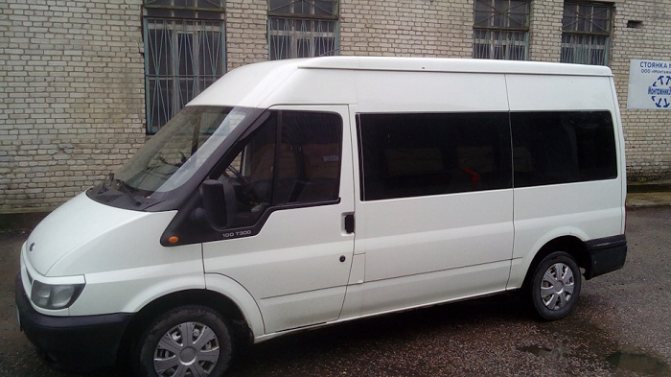
- Egor. Moscow. I have a Ford Transit minibus with a 2.0 engine. Quite economical and reliable car. I completely fill the 80-liter tank, most often at a Lukoil gas station, and travel for work mostly outside the city. I can say that the tank is enough for about 900 km, so on the highway the average consumption is 8.2 liters. This is a very good indicator, because the manufacturer certified the figure as 8.8 liters. I drive carefully and never exceed 110 km/h. In the city, about 10 liters per 100 km.
- Alexey, Voronezh. Much depends on external factors. For example, I have a Ford Transit with a booth, which often has to be loaded to failure. With a frontal wind, the level of consumption increases - under the most unfavorable conditions, it burns 15 liters per 100 km within city limits. Outside the city 9-10 l. Under normal conditions, consumption fully corresponds to the factory standard.
- Maxim, Tyumen. Having owned various cars at one time, I noticed each time that the level of consumption is significantly influenced by driving style. At an average speed of 100 km/h on the highway, you can achieve the greatest efficiency - approximately 6.5 liters. I mostly fill it with Rosneft, I like how the car behaves on this fuel.
Article on the topic: How to independently replace the internal grenade on VAZ cars
The Ford Transit version with a 2-liter engine under the hood has good efficiency. Owners note that moderate consumption can be achieved through a calm driving style. When fully loaded, an overconsumption of 2-3 liters is possible.
Car with 2.2 engine
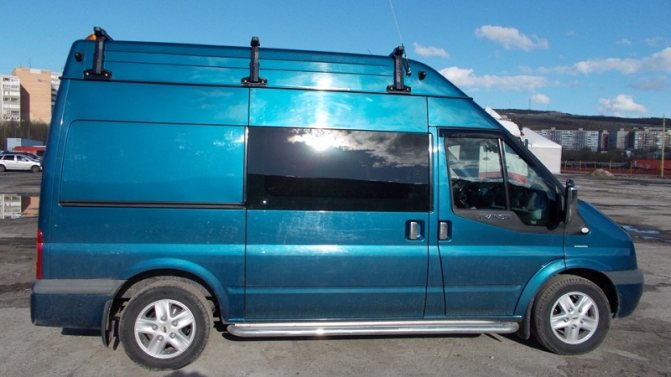
- Valentin, Cheboksary. I have a 2020 Ford Transit 2.2 TDCi. Finding out the exact value of gasoline consumption is quite difficult for various reasons. But there is one reliable method that I used not long ago. I filled up a full tank of gasoline, took a 20-liter canister as a reserve, and started riding. I drove until the engine completely stalled. In general, a full tank, which is 80 liters, was enough for me for 880 km, taking into account a calm driving style in the mixed cycle.
- Sergey, Chelyabinsk. I noticed one surprising thing - the consumption on my 2020 Transit within the city is lower than on the highway. In Chelyabinsk, on average, 8 liters are fired when unloaded, and when partially/fully loaded, 10-11 liters, which is also below the norm. And on the highway you get 1-1.5 liters more fuel. So I’m wondering what could be the reason.
- Stanislav, Rostov. My car “eats” 8-9 liters in Rostov when it is completely “empty”. Maximum 10 liters when fully loaded. If you put pressure on the trigger, you can go beyond these limits. Outside the city, 9 liters, when you drive on average 120-130 km/h, a lot depends on your driving style and the quality of diesel fuel. In winter, around 11-11.5 liters per 100 km, taking into account traffic jams and warming up.
Owners of a Ford Transit with a modern 2.2-liter engine note the cost-effectiveness of the modification. The van consumes less than the norm declared by the manufacturer under a calm driving style and normal operating conditions. In the winter season, the consumption level increases by 1-2 liters.
Modification 2.4
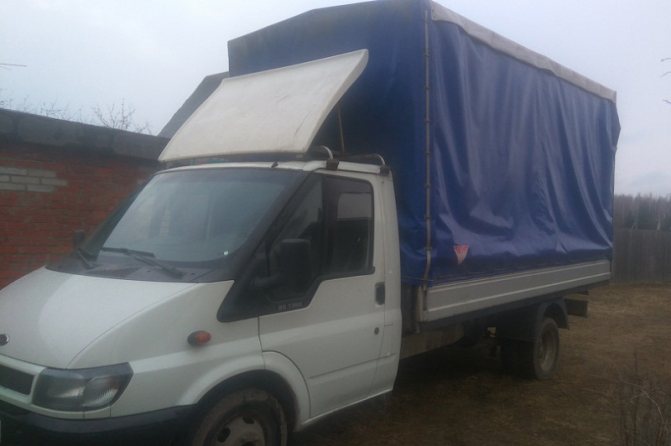
- Valery, Kursk. In 2010, I purchased a minibus with a 2.4 140 horsepower engine. At first, little gasoline was consumed, but gradually the figure began to increase. According to the computer, 530 km consumed a whole tank, but in fact it was 470 km. I went for diagnostics, they reflashed the controller, nothing has changed, the “appetite” is at the level of 14-15 liters, which does not suit me at all. I drive carefully, my driving style has always been the same, but for some reason the figure is constantly increasing, I load a maximum of 500 kg.
- Yuri, Ekaterinburg. A mark around 14-15 is normal for such a car. I have such indicators in the summer, and in winter it generally reaches 19 liters per hundred. True, I have a Ford Transit with a twin, that’s why these numbers are there. The difference between a minibus and a barn is the frontal resistance, the aerodynamics of the second one are worse, so you need to come to terms with this and not look for a problem, since in principle there is none.
- Alexey, Novokuznetsk. Minibus 2011, 16 seats, 140 horses, a full tank lasts for 760 km in summer, 700 km in winter. The speed is maximum 130 km/h, I drive both around the city and outside it. I rarely drive empty, so you can take into account that this is with a partial load.
Article on the topic: The engine does not pick up speed well - where to look for the problem?
The 2.4-liter engine can be called one of the most “gluttonous” of the Ford Transit line of power units. However, it is important to consider the modification of the vehicle. A minibus consumes fuel within normal limits; overconsumption is observed in vans.
Car with 2.5 engine
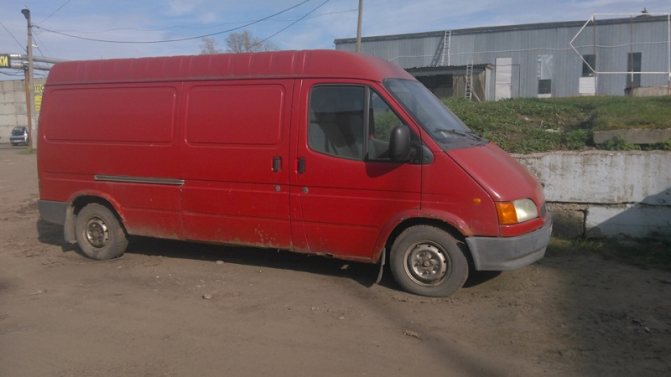
- Andrey, Tomsk. I have a 1995 Transit with a 2.5 liter engine with 150 horsepower. A solid and reliable car that you don’t want to part with. When I purchased the car, it was not in the best condition. The “appetite” was immoderate – 15-16 liters at least. I decided to take care of the transport and bring it into proper condition. I set the ignition correctly and immediately noticed significant differences. The efficiency is noticeable - the consumption level has dropped to the factory norm of 13/9 liters per 100 km.
- Mikhail, Yalta. I drive a tall bus (minibus) with a 2.5 engine, I bought the car in 2010 with a mileage of 220 thousand km. The gearbox is five-speed manual, produces 12-14 liters in the city, revs 3000, 90 km/h maximum, in winter the “appetite” increases to a limit of 16-18 liters. I rarely drive on the highway, but when I do, it’s 12 liters per 100 km on average.
- Nikolay, Volgograd. My driving style is far from calm, the modification with a booth is constantly loaded, there is no talk of efficiency. The car consumes 16.5 liters for every hundred kilometers. During frosts up to 19 l. I can say that previously, under the same conditions, the numbers were 2 liters less.
The 2.5-liter version also cannot boast of efficiency. In some cases, the overconsumption is 4-5 liters; the level of fuel consumption is influenced by driving style and external factors.
Share with friends on social networks:
Telegram
How much oil is in a Ford Transit engine?
How many liters should I fill?
- 2.2 TC (CYRB, CYRC) - 10.1 l
- 2.2 TC/ FWD/TDCi (CYFA, CYFB, CYFC, CYFD, DRFA, DRFB, DRFC, DRFD, DRFE, PGFB, UHFA, UHFB, UHFC, PGFA, QVFA) - 6.2 l
- 2.3 16V RWD (GZFB, GZFA, GZFC) - 4.3 l
- 2.4 TDCi/RWD (H9FB, PHFA, PHFC) - 9 l
- 3.2 TDCi RWD (SAFA, SAFB) - 11.4 l
Note
: if desired, the car owner can also use motor oils with a different viscosity (5W40 and 10W40) that meet ACEA A5/B5 approvals for gasoline and ILSAC GF-3 diesel engines.
Ford Transit engines. Official fuel consumption per 100 km.
Generation 4, 1986 – 2000 (using the example of the Transit Van version, 1986-1991)
Gasoline:
- 1.6, 63 l. p., manual transmission, production from 1986 to 1991
- 2.0, 78 l. p., manual transmission, production from 1986 to 1991
Diesel:
- 2.5, 68 l. pp., manual transmission, 1996-1991
- 2.5, 71 l. pp., manual transmission, 1988-1991
Generation 5 (2000-2006)
Gasoline:
- 2.3, 145 l. p., manual transmission
Diesel:
- 2.0, 85 l. p., manual transmission
- 2.0, 100 l. s., MPP
- 2.0, 75 l. s., MCP
- 2.4, 120 l. p., manual transmission
- 2.4, 75 l. p., manual transmission
- 2.4, 90 l. p., manual transmission
Generation 6
Diesel:
- 2.2, 100 l with, manual transmission (2006-2015)
- 2.2, 125 l. pp., manual transmission (2006-2015)
- 2.2, 155 l. pp., manual transmission (2006-2015)
- 2.4, 140 l. pp., manual transmission) 2006-2015)
- 2.2, 85 l. pp., manual transmission (2006-2015)
- 2.2, 115 l. pp., manual transmission (2006-2015)
- 2.0, 75 l. pp., manual transmission (2000-2006)
- 2.4, 90 l. pp., manual transmission (2000-2006)
- 2.4, 120 l. pp., manual transmission (2000-2006)
Generation 7
Diesel:
- 2.2, 125 l. pp., manual, front, consumption (city/highway/mixed) – 7.3/5.9/6.4 l per 100 km
